When I first considered dental implants for my missing tooth, I thought they were the perfect solution for everyone. After all, they’re often called the “gold standard” of tooth replacement. But as I dove deeper into research and spoke with dental professionals, I discovered that dental implants aren’t always the best choice for every patient. Sometimes, there are compelling reasons not to get dental implants that could save you from complications, disappointment, and significant financial loss.
While dental implants have revolutionized modern dentistry with their durability and natural appearance, they’re not a one-size-fits-all solution. Understanding when implants might not be appropriate can help you make an informed decision about your oral health and avoid potential problems down the road.
Key Takeaways
- Medical conditions like uncontrolled diabetes, autoimmune disorders, and certain medications can significantly increase implant failure rates
- Financial considerations go beyond the initial cost, including potential complications, maintenance, and long-term care expenses
- Lifestyle factors such as smoking, teeth grinding, and poor oral hygiene can dramatically reduce implant success rates
- Age and healing capacity play crucial roles in determining whether implants are viable long-term solutions
- Alternative treatments may be more appropriate depending on your specific situation, bone health, and treatment goals
Medical Reasons Not to Get Dental Implants
Uncontrolled Diabetes and Blood Sugar Issues 🩺
Diabetes poses one of the most significant risks to dental implant success. When blood sugar levels remain consistently high, your body’s ability to heal properly becomes severely compromised. I’ve learned that patients with uncontrolled diabetes face implant failure rates that can be three to four times higher than those with well-managed blood sugar.
The problem lies in how diabetes affects:
- Wound healing – High glucose levels slow down the body’s natural healing process
- Infection resistance – Compromised immune system increases risk of peri-implantitis
- Bone integration – Poor blood circulation affects osseointegration (bone fusion with implant)
If you have diabetes, it doesn’t automatically disqualify you from implants, but your HbA1c levels should be well-controlled (typically below 7%) for several months before considering the procedure.
Autoimmune Disorders and Immune System Complications
Autoimmune conditions create a challenging environment for dental implant success. Conditions like rheumatoid arthritis, lupus, and Sjögren’s syndrome can interfere with the healing process and increase the risk of implant rejection.
Key concerns include:
- Medications that suppress immune function
- Chronic inflammation affecting bone health
- Reduced saliva production leading to increased infection risk
- Unpredictable healing responses
Cancer Treatment and Radiation Therapy
If you’ve undergone radiation therapy to the head and neck area, dental implants may not be advisable. Radiation can cause:
- Osteoradionecrosis – Death of bone tissue
- Reduced blood supply to the jaw
- Increased infection risk
- Poor healing capacity
Patients who have received chemotherapy may also face challenges due to compromised immune systems and altered bone metabolism.
Financial Reasons Not to Get Dental Implants 💰
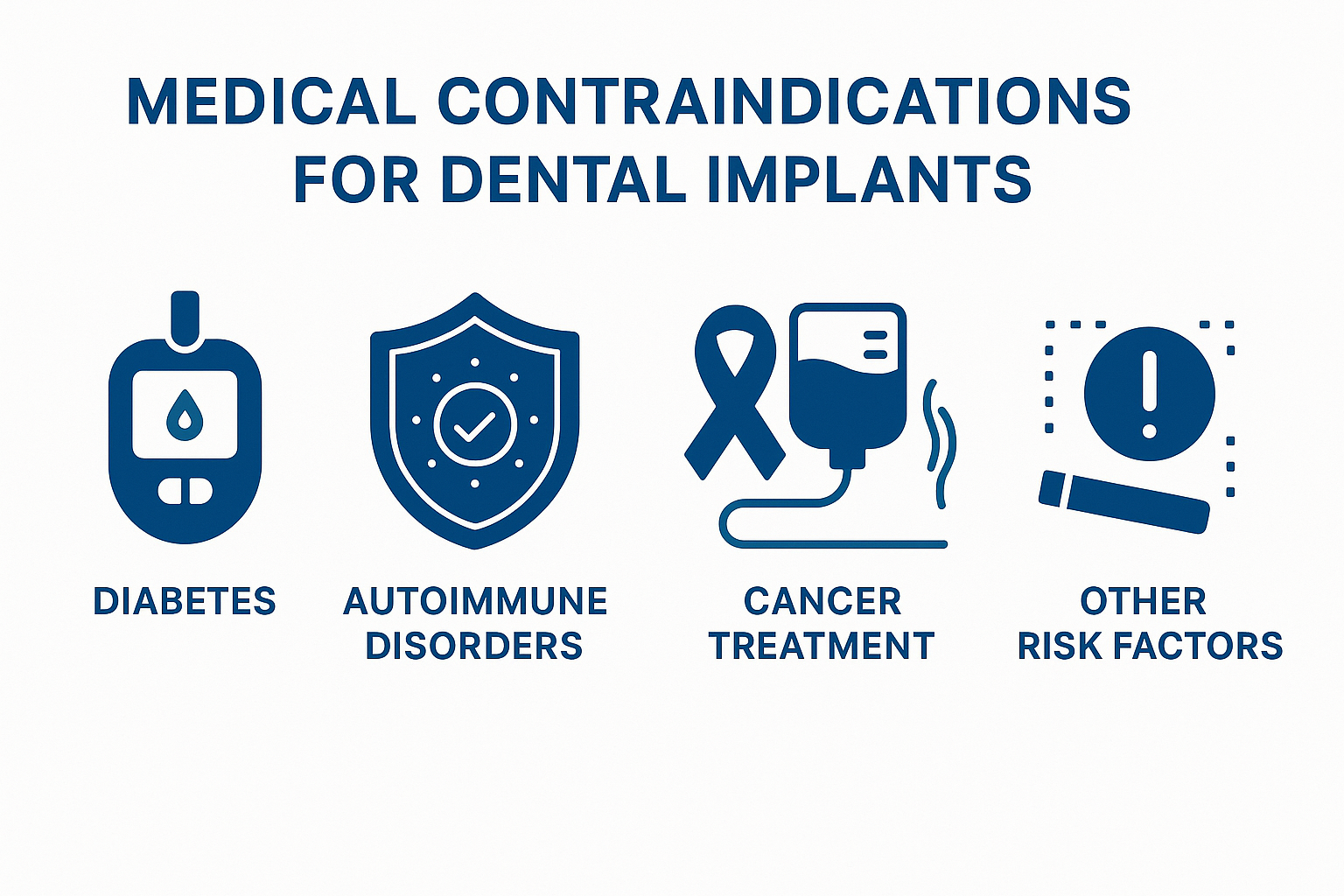
The True Cost Beyond Initial Treatment
When considering dental implants in Dallas, many patients focus only on the upfront cost without considering the long-term financial commitment. The reality is that implants can become significantly more expensive when complications arise.
Hidden costs often include:
- Bone grafting procedures (additional $500-$3,000 per site)
- Sinus lift surgeries ($1,500-$5,000)
- Treatment of complications like peri-implantitis
- Crown replacements every 10-15 years
- Regular maintenance and professional cleanings
Understanding factors affecting implant cost in Dallas can help you budget more accurately for the total investment.
Insurance Limitations and Coverage Gaps
Most dental insurance plans provide limited coverage for implants, often treating them as cosmetic procedures. This means you might face:
- 50% or less coverage for the implant procedure
- Annual maximum limits that don’t cover full treatment
- Waiting periods before coverage begins
- Pre-authorization requirements that may be denied
If you’re struggling with the financial aspect, exploring payment plans for implants in Dallas or looking into affordable dental implants might provide better options.
Opportunity Cost of Investment
The money spent on dental implants could potentially be invested elsewhere or used for other health priorities. Consider whether:
- You have other pressing medical needs
- Emergency funds would be depleted
- Alternative treatments might provide adequate function at lower cost
- The investment aligns with your long-term financial goals
Lifestyle and Behavioral Reasons Not to Get Dental Implants
Smoking and Tobacco Use 🚭
Smoking is one of the strongest predictors of implant failure. Tobacco use affects implant success in multiple ways:
- Reduced blood flow to the surgical site
- Impaired immune response increasing infection risk
- Poor bone healing affecting osseointegration
- Increased risk of peri-implantitis (implant gum disease)
Studies show that smokers have implant failure rates of 15-20% compared to just 1-5% in non-smokers. Even if implants initially succeed, long-term complications are significantly more likely.
Teeth Grinding and Clenching (Bruxism)
If you grind your teeth at night or clench your jaw during stress, dental implants may not be the best choice. Excessive force can cause:
- Implant crown fractures
- Loosening of implant components
- Bone loss around the implant
- Mechanical complications requiring expensive repairs
While night guards can help protect implants, severe bruxism may make other tooth replacement options more practical.
Poor Oral Hygiene Habits
Dental implants require meticulous oral care to prevent peri-implantitis, which can lead to implant loss. If you struggle with:
- Regular brushing and flossing
- Attending dental appointments
- Following post-operative instructions
- Maintaining consistent oral care routines
Then implants may not be suitable for you. The investment is too significant to risk due to preventable complications.
Age and Health Considerations
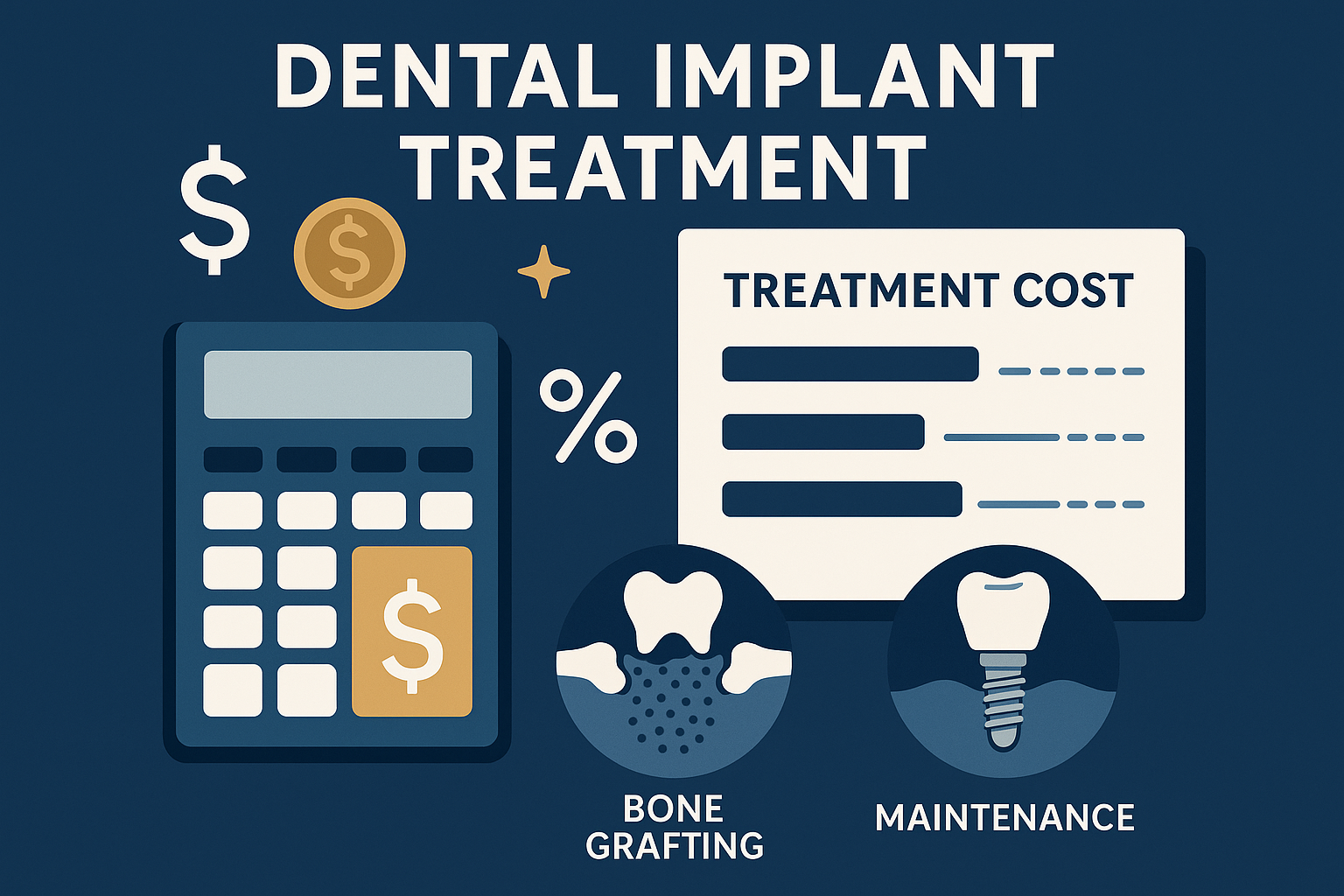
Very Young Patients
Dental implants aren’t recommended for patients whose jaw bones are still growing. This typically means:
- Males under 18-21 years old
- Females under 16-18 years old
- Anyone with incomplete facial development
Placing implants before growth completion can result in:
- Misaligned implants as the jaw continues to develop
- Aesthetic problems
- Functional complications
- Need for additional corrective procedures
Advanced Age and Healing Capacity
While age alone isn’t a contraindication for implants, advanced age combined with multiple health conditions can create challenges:
- Slower healing processes
- Increased medication interactions
- Higher risk of complications
- Reduced ability to maintain proper oral hygiene
For elderly patients, simpler solutions like well-fitted dentures might provide better quality of life with less risk.
Dental Implant Suitability Assessment
Answer these questions to evaluate potential risk factors for dental implant complications
Bone Health and Structural Issues
Insufficient Bone Density
Adequate bone density is crucial for implant success. If you have:
- Osteoporosis or osteopenia
- Previous tooth loss that resulted in significant bone resorption
- Naturally thin jawbone structure
- History of bone loss due to gum disease
You may not be a good candidate for implants without extensive bone grafting procedures. These additional procedures add significant cost, time, and complexity to treatment.
Anatomical Limitations
Some patients have anatomical features that make implant placement challenging or impossible:
- Shallow sinuses in the upper jaw
- Nerve proximity in the lower jaw
- Unusual jaw shape or size
- Previous surgical complications affecting jaw structure
Alternative Treatment Considerations
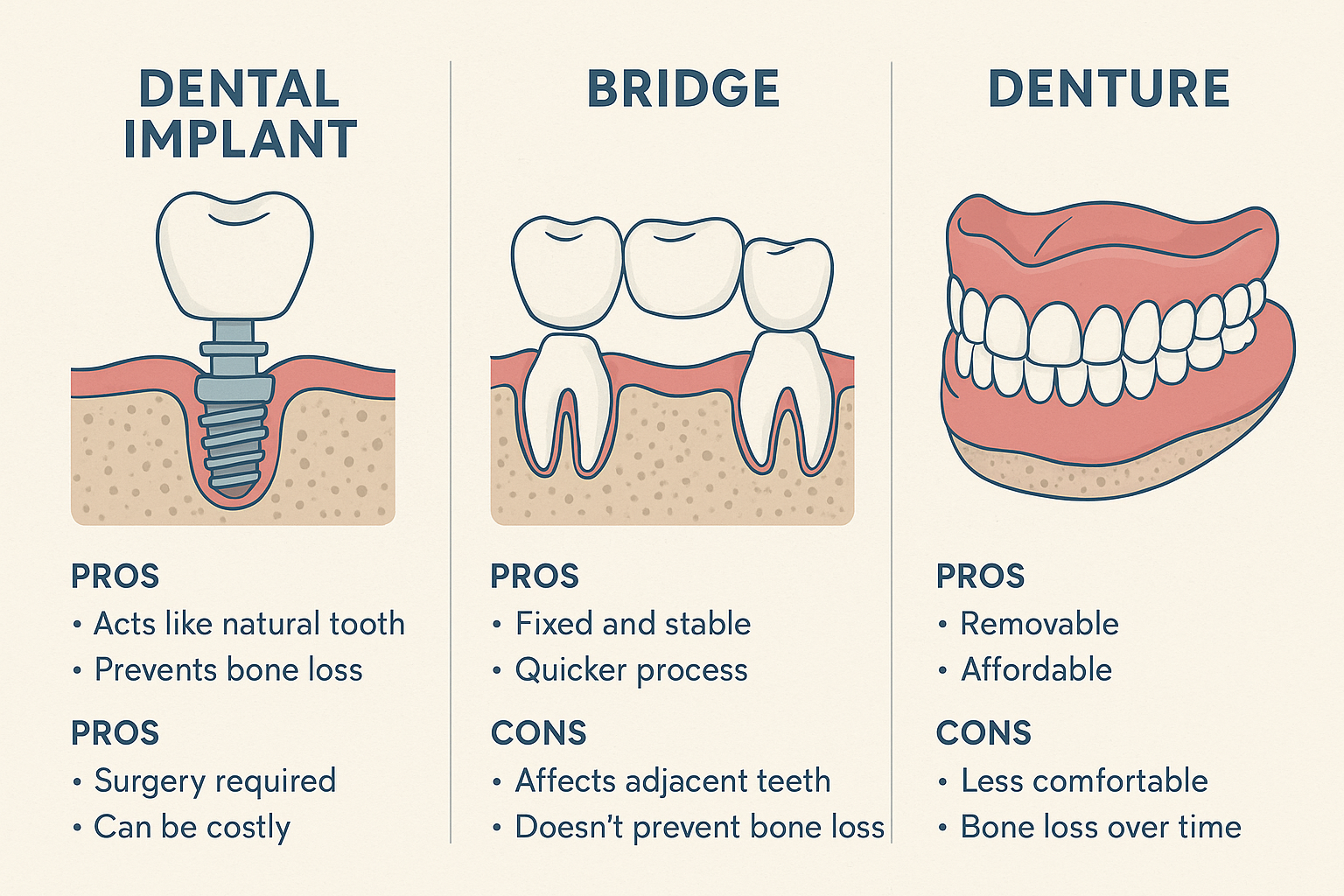
When Bridges or Dentures Might Be Better
There are situations where traditional alternatives to implants provide better outcomes:
Bridges may be preferable when:
- Adjacent teeth need crowns anyway
- Multiple teeth need replacement in a row
- Cost is a primary concern
- Quick treatment timeline is essential
Dentures might be better for:
- Patients with multiple medical contraindications
- Those requiring full mouth reconstruction
- Individuals with limited dexterity for implant maintenance
- Cases where low-cost dental implants still exceed budget constraints
Partial Solutions and Compromise Treatments
Sometimes a hybrid approach works best:
- Implant-supported dentures instead of individual implants
- Strategic implant placement for key teeth only
- Removable partial dentures for back teeth
- Orthodontic space closure instead of replacement
The Importance of Realistic Expectations
Success Rates Aren’t 100%
While dental implants have high success rates (typically 95-98%), failure can and does occur. Factors that increase failure risk include:
- Peri-implantitis (infection around the implant)
- Mechanical complications (crown or abutment issues)
- Implant fracture (rare but possible)
- Failed osseointegration (bone doesn’t fuse properly)
When implants fail, patients often face:
- Additional surgery for removal
- Bone grafting to repair damage
- Alternative treatment planning
- Significant additional costs
Long-term Maintenance Requirements
Dental implants require lifelong maintenance that some patients underestimate:
- Professional cleanings every 3-4 months
- Specialized home care tools and techniques
- Regular X-rays to monitor bone levels
- Potential crown replacements every 10-15 years
- Treatment of complications if they arise
Making an Informed Decision
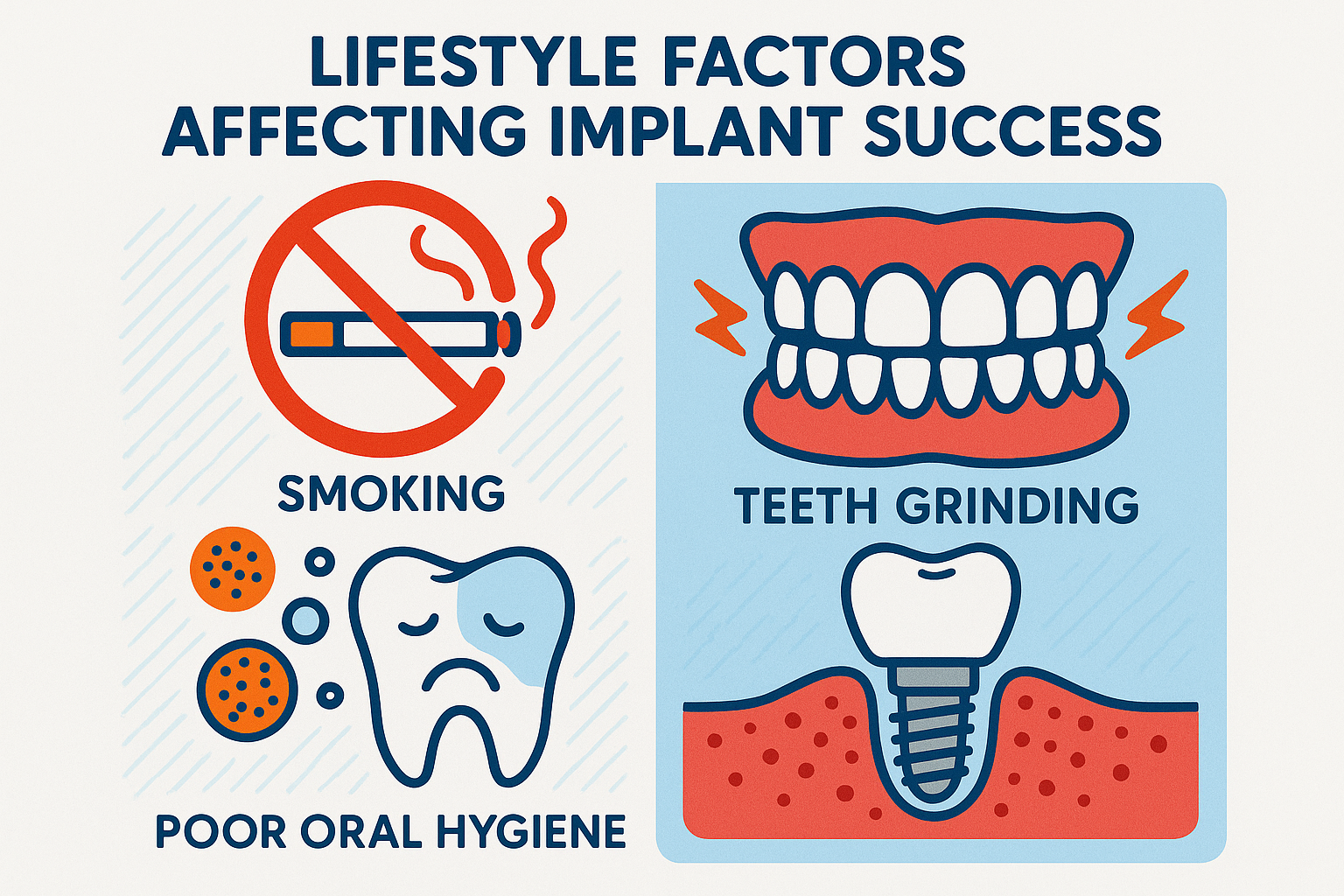
Questions to Ask Your Dentist
Before proceeding with implants, consider asking:
- What are my specific risk factors?
- What’s my estimated success rate based on my health profile?
- What are the alternatives and their pros/cons?
- What’s the total long-term cost including maintenance?
- What happens if the implant fails?
When choosing a provider, it’s essential to work with experienced professionals. Learn more about how to choose a dental implant dentist and find qualified dental implant specialists who can provide honest assessments of your candidacy.
Getting Multiple Opinions
Don’t rush into implant treatment. Consider:
- Consulting with multiple specialists
- Getting detailed treatment plans from each
- Comparing costs and timelines
- Asking about alternative approaches
- Taking time to research and reflect
Understanding why dental implants cost so much in Dallas can help you evaluate whether the investment makes sense for your situation. If cost is a concern, explore options for how to save money on dental implants or investigate affordable implant options.
Red Flags: When to Definitely Avoid Implants
Immediate Contraindications ⚠️
Certain situations make implant treatment inadvisable:
- Active cancer treatment affecting the head and neck
- Uncontrolled bleeding disorders
- Severe mental health conditions affecting treatment compliance
- Active substance abuse problems
- Pregnancy (timing considerations)
- Recent heart attack or stroke (within 6 months)
Lifestyle Red Flags
Some lifestyle factors create such high risk that implants should be avoided:
- Heavy alcohol use affecting healing
- Extreme sports participation with high facial injury risk
- Inability to attend follow-up appointments
- Unwillingness to modify risk behaviors (like smoking)
- Unrealistic expectations about outcomes
Economic Alternatives and Practical Solutions
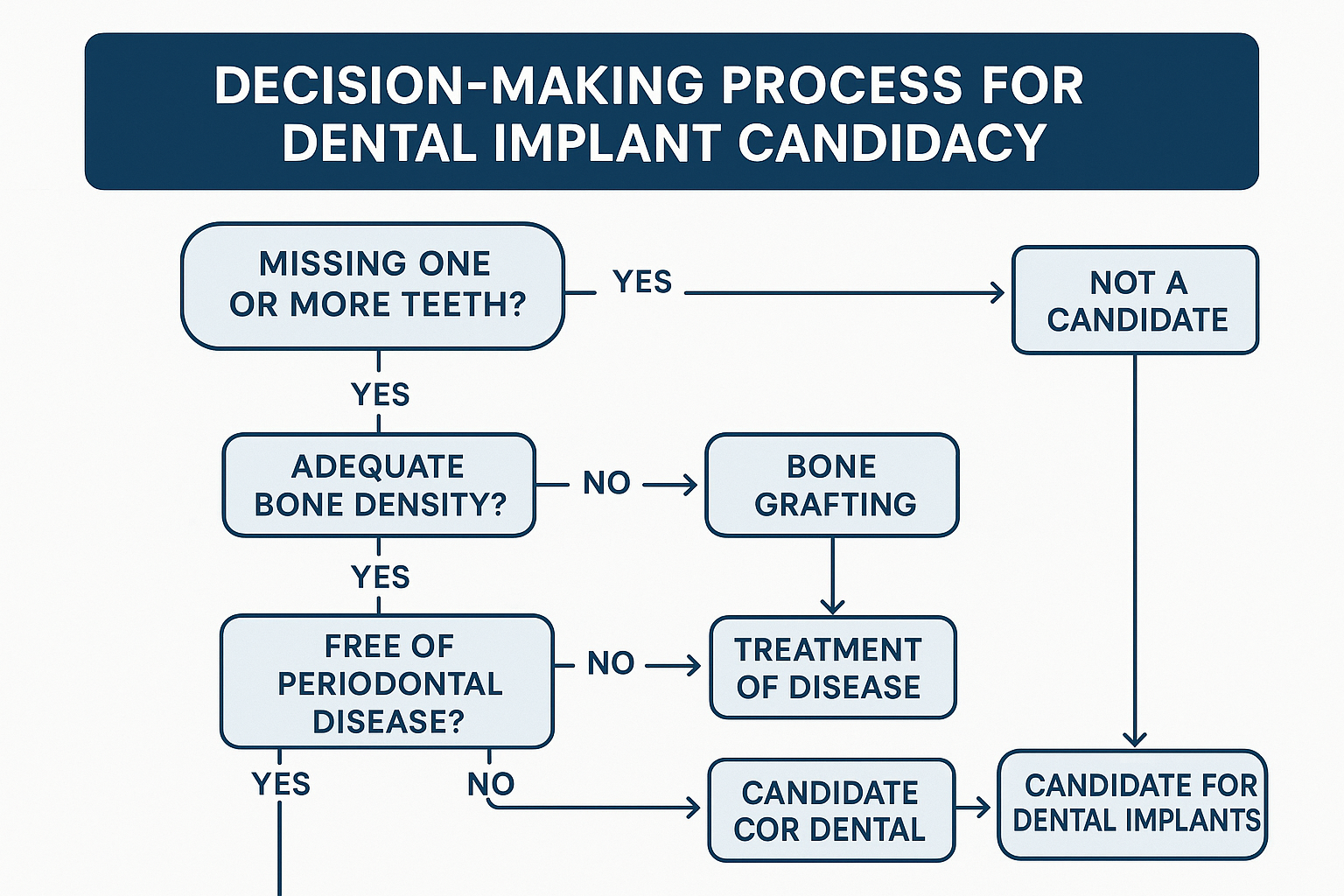
Cost-Effective Tooth Replacement Options
If implants aren’t right for you, several alternatives can restore function and aesthetics:
Removable Partial Dentures:
- Cost: $300-$1,500 per arch
- Pros: Affordable, non-invasive, adjustable
- Cons: Less stable, require daily removal
Fixed Bridges:
- Cost: $2,000-$5,000 for 3-unit bridge
- Pros: Fixed in place, good aesthetics
- Cons: Requires altering adjacent teeth
Resin-Bonded Bridges:
- Cost: $1,000-$2,500
- Pros: Conservative, reversible
- Cons: Less durable, limited applications
Timing Considerations
Sometimes it’s not that you should never get implants, but rather that now isn’t the right time. Consider delaying if:
- You’re planning major life changes
- Financial situation is unstable
- Health conditions need optimization
- You’re under significant stress
- Other dental work needs completion first
Conclusion
While dental implants represent an excellent tooth replacement option for many patients, they’re not universally appropriate. Understanding the reasons not to get dental implants can save you from complications, financial strain, and disappointment.
The most important factors to consider include your overall health status, lifestyle habits, financial situation, and realistic expectations about outcomes. Medical conditions like uncontrolled diabetes, autoimmune disorders, and the effects of cancer treatment can significantly impact implant success. Lifestyle factors such as smoking, teeth grinding, and poor oral hygiene create substantial risks that may outweigh the benefits.
Your next steps should include:
- Honest self-assessment of your health and lifestyle factors
- Consultation with qualified specialists who can provide objective evaluations
- Exploration of alternative treatments that might better suit your needs
- Financial planning that accounts for long-term costs and potential complications
- Time for reflection before making this significant investment
Remember, the goal isn’t just to replace missing teeth—it’s to find the solution that best serves your overall health, lifestyle, and long-term well-being. Sometimes that solution isn’t dental implants, and that’s perfectly okay.
If you do decide to explore implants further, work with experienced professionals who will honestly assess your candidacy and discuss all available options. The right treatment is the one that aligns with your individual circumstances and provides the best long-term outcome for your unique situation.
SEO Meta Information:
Meta Title:
Meta Description:
Image Prompts
IMAGE_PROMPT_1: Create a professional cover image in 1536×1024 landscape format showing a thoughtful patient consulting with a dentist in a modern dental office. Overlay the title “When Dental Implants Aren’t Right for You: Important Reasons Not to Get Dental Implants” in bold, modern typography. Use white and navy blue text with good contrast against a soft, neutral background. Include visual elements like dental X-rays or consultation materials to reinforce the decision-making theme.
IMAGE_PROMPT_2: Design a 1536×1024 infographic showing medical contraindications for dental implants. Include icons and text for diabetes, autoimmune disorders, cancer treatment, smoking, and other risk factors. Use a clean, medical-style design with blue and white color scheme. Ensure all text is clearly readable and properly sized within the image boundaries.
IMAGE_PROMPT_3: Create a 1024×1024 square image illustrating the financial aspects of dental implant treatment. Show a calculator, money symbols, and treatment cost breakdown. Include visual elements representing hidden costs like bone grafting and maintenance. Use professional colors like navy blue, white, and subtle gold accents.
IMAGE_PROMPT_4: Design a 1536×1024 landscape image comparing dental implants with alternative treatments. Show side-by-side illustrations of implants, bridges, and dentures with pros and cons listed. Use clean, educational styling with consistent typography and medical illustration aesthetic.
IMAGE_PROMPT_5: Create a 1024×1024 image focusing on lifestyle factors affecting implant success. Include visual representations of smoking, teeth grinding, poor oral hygiene, and their effects on dental health. Use warning colors like red and orange combined with medical blue and white for contrast.
IMAGE_PROMPT_6: Design a 1536×1024 infographic showing the decision-making process for dental implant candidacy. Include a flowchart or decision tree with key questions and considerations. Use professional medical colors and ensure all text elements are clearly visible and properly aligned within the image boundaries.

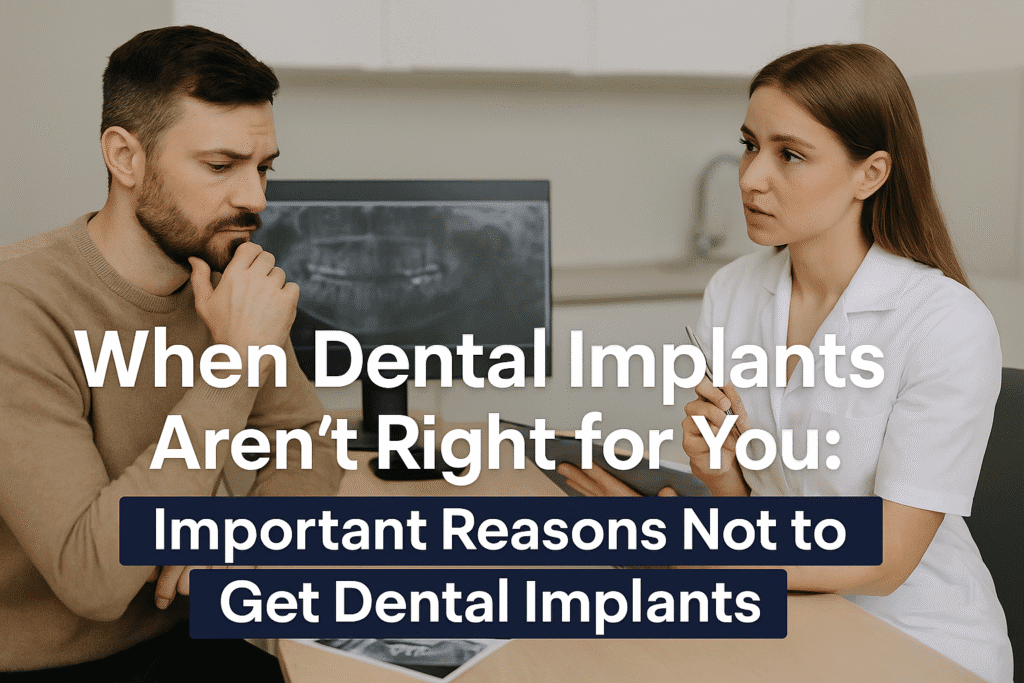
Leave a Reply
Share your thoughts or ask a question about dental implants. Your email address will not be published.